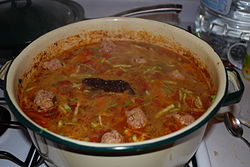Simmering

Simmering is a food preparation technique by which foods are cooked in hot liquids kept just below the boiling point of water[1] (lower than 100 °C or 212 °F) and above poaching temperature (higher than 71–80 °C or 160–176 °F). To create a steady simmer, a liquid is brought to a boil, then its heat source is reduced to a lower, constant intensity (smaller flame on a gas stove, lower temperature on an induction/electric stove).
Methods and equipments
[edit]Simmering ensures gentler treatment than boiling to prevent food from toughening and/or breaking up. Simmering is usually a rapid and efficient method of cooking. Food that has simmered in milk or cream instead of water is sometimes referred to as creamed. The appropriate simmering temperature is a topic of debate among chefs, with some contending that a simmer is as low as 82 °C or 180 °F.[2]
Some modern gas ranges are equipped with a simmering burner, with such burners usually located at the rear of the range. Many electric ranges have a simmer setting.
Slow cookers are countertop electrical appliances used to simmer foods for hours at a time.[3]
By cuisine
[edit]Japanese cuisine
[edit]In Japanese cuisine, simmering is often considered one of the four essential cooking techniques, along with grilling, steaming, and deep frying.[4]
American cuisine
[edit]Food prepared in a crockpot is simmered. Examples include stews, chili, soups, etc.
Bulgarian cuisine
[edit]Bulgarian traditional food, especially tender meat dishes are often simmered for extended periods of time. Examples include stews, soups, Vanyas, etc.
Dutch and Flemish cuisine
[edit]
In traditional Dutch and Flemish cuisine, less tender cuts of beef are simmered for several hours to obtain carbonade flamande. Traditionally a small flame is used, fed by burning oil. On modern stoves, the source of heat is put very low, or a simmering plate is used to diminish the heat. Usually a cast iron pan is used with a thick bottom. The meat is ready if it can be easily torn apart into threads.[5]
Persian cuisine
[edit]Simmering is one of the most popular styles of cooking in Iran and Afghanistan. In traditional Persian cuisine, almost all types of Persian Khoresh are simmered for several hours. That is also the case with some other Iranian dishes like Abgoosht, Bozbash, etc.
Jewish cuisine
[edit]Simmering is the main cooking techinque used in Shabbat stews because by Jewish law cooking is forbidden on Shabbat. Almost every Jewish diaspora group has had different versions of sabbath stews, with the common practice of boiling before Sabbath begins and than keeping the pot on a blech or other device to heat the food.[6] Many Shabbat dishes are simmered overnight to conform to Jewish law, including cholent (Ashkenazi Jewish),[7] hamin (Sepharadi Jewish)[6] and t'bit (Iraqi Jewish).[8]
References
[edit]- ^ Simmer definition from About.com - Culinary arts. Retrieved May 2009.
- ^ The Culinary Institute of America (CIA). (2011). The Professional Chef, 9E (p. 263). Hoboken, NJ: John Wiley & Sons, Inc.
- ^ Gisslen, W. (2011). Professional Cooking, 7E (p. 71). Hoboken, NJ: John Wiley & Sons, Inc.
- ^ Hosoi, C. (2012). Cooking Classics: Japan. A Step-by-Step Cookbook (p. 13). Singapore: Marshall Cavendish Cuisine.
- ^ "Simmering meat". Retrieved 1 June 2015.
- ^ a b Marks, Gil (2010-11-17). Encyclopedia of Jewish Food. HMH. ISBN 978-0-544-18631-6.
- ^ "Cholent offers many meaty lessons about Jewish history and law". The Canadian Jewish News. 2017-01-30. Retrieved 2023-12-05.
- ^ "Iraqi Chicken Stuffed With Spiced Rice Recipe | The Nosher". My Jewish Learning. 2019-09-20. Retrieved 2023-12-05.
